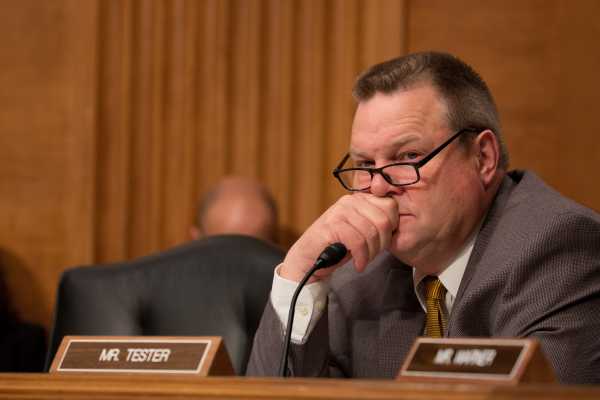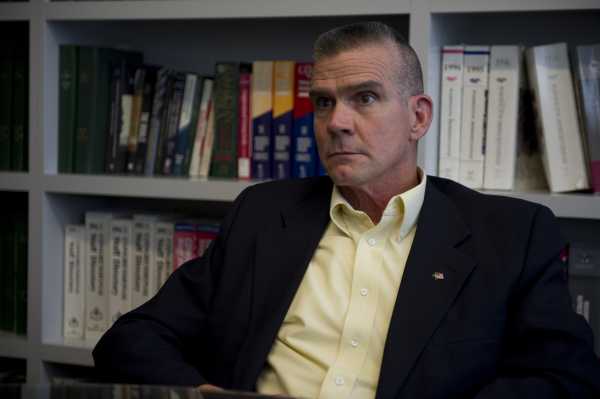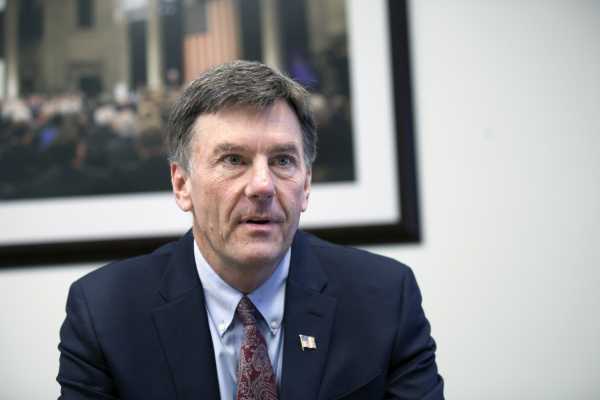
Millions of dollars are flowing into Montana’s US Senate race before voters go to the polls on Tuesday — and that’s just for the Republican primary.
GOP candidates and conservative outside groups have already poured about $5.7 million into the primary for Montana’s US Senate race on Tuesday. That’s about $5.60 per resident and about $8 per registered voter in the state, which has a population of about 1 million. Even in increasingly expensive general elections, this level of spending in a primary is something new.
“We really haven’t seen this level of spending in a primary in any of the cycles I’m aware of,” University of Montana journalism professor Lee Banville said.
The deluge of money speaks to how badly Republicans want to unseat Montana’s Democratic Sen. Jon Tester, the ranking member of the Veterans Affairs Committee and one of the most vulnerable Senate Democrats in 2018. Donald Trump won Montana by 20 points in 2016, and after a recent fracas over Trump’s nominee to lead the US Department of Veterans Affairs, Trump has been focused on beating Tester, who was first elected in 2006.
Four Republicans — state auditor Matt Rosendale, retired Judge Russ Fagg, business executive Troy Downing, and state Sen. Albert Olszewski — are vying for the chance to run against him.
And as the primary approaches and Rosendale and Fagg emerge as the frontrunners, the drama in a formerly sleepy race is ramping up. Attack ads are blanketing local television stations, and Fagg and Rosendale are taking shots at each other. Tester, who has $6.2 million in campaign cash so far, will be a formidable opponent for whoever emerges.
Beyond Tuesday’s outcome, the big question is how hard Trump will campaign against Tester — and whether it will be enough to flip a Senate seat in a deep-red state.
Who are the Republicans?
Tester is facing no Democratic challenger on Tuesday, so the primary is all about the Republicans. The state has an open primary, meaning Democrats, Republicans, and independents can all cast ballots.
Matt Rosendale, seen as the favorite of national Republicans and prominent conservative groups, is Montana’s state auditor and the former state senator. He’s been endorsed by Sens. Ted Cruz (R-TX), Rand Paul (R-KY), and Mike Lee (R-UT), and conservative groups like Club For Growth, Restoration PAC, and Americas PAC are spending millions on campaign ads for him.

But Rosendale lacks something important that can’t be bought: He isn’t originally from Montana. He moved to the Big Sky State from Maryland about 16 years ago, bringing a noticeable Maryland accent with him — as Slate’s Jim Newell pointed out.
In 2015, Rosendale signed a property form to sell 25 acres of land he owned in Maryland. Under penalty of perjury, he indicated he was a resident of Maryland at the time, even though he was living in Montana. (The title company that handled the forms has said the property form was its mistake, not Rosendale’s.)
Sixteen years in a state might seem like long enough to escape being tagged as a carpetbagger. But Fagg is hitting Rosendale as an out-of-touch outsider from the East Coast. Recently, an outside group called Principles First started airing an ad of “Maryland Catch Matt Rosendale” being engulfed by ocean water. Meanwhile, the state Democratic Party is dinging him for saying he’s a cattle rancher, even though public records indicate he has rented his land to other ranchers.
Fagg is a retired judge, a former state legislator, and a fourth-generation Montanan who hails from Billings. He has less money and national support than Rosendale, but the state’s Republican political establishment, including a number of former governors and Congress members, have lined up behind him. Former Republican Govs. Marc Racicot and Stan Stephens and former Reps. Denny Rehberg and Rick Hill have all endorsed Fagg.

“Montanans deserve more than a U.S. Senator whose top priority is climbing the political ladder,” the four men wrote in a recent pro-Fagg op-ed in the Helena Independent Record. “Montanans deserve more than a U.S. Senator who puts the party agenda and endorsements from D.C. insiders above Montana.”
But Club for Growth, one of the conservative groups backing Rosendale, is spending thousands on ads to attack Fagg’s judicial record, pointing to a past five-year sentence Fagg gave a man as part of a plea agreement who was convicted of assaulting his child and attempting to strangle his wife.
Other ads have tried to portray Fagg as a moderate, painting him as friendly to fellow judges who tried to halt immigrant deportations and stop the Trump administration’s rollback of environmental rules.
“Clearly someone is worried about Russ Fagg because they’re spending a lot of money to beat him,” Banville said.
Because Montana is such a large state, TV ads are a crucial way for candidates to communicate. But Fagg has been painting Rosendale’s attacks funded by outside groups as yet another way for East Coasters to try to influence the primary in the state.
“That has been a theme that has been hit by both parties — on outside money coming in,” Banville said. “That’s a thing out here, the sense that Montanans want to have a say in who represents them.”
Furthermore, Banville said, being from Montana and actually living the state’s lifestyle is crucial for candidates that want to represent the state. “It’s really come down to: Are you a real Montanan, do you ranch?”
It’s too early to tell whether a backlash to negative ads will actually give Fagg a boost. But he’s clearly a serious challenger to Rosendale.
Should Tester be worried in November?
Tester is one of the most prominent Democrats in a state that reliably votes red and overwhelmingly went for Trump, so the conventional wisdom is that he should be worried in 2018.
Still, while it’s true that Montana tends to be conservative, the state also has a long history of electing Democrats (Gov. Steve Bullock is a Democrat). The state almost always votes for the Republican candidate for president, but voters also swing between Democratic and Republican candidates in races for governor and Congress fairly often.
In a state like Montana, the sense that a candidate is genuinely of Montana and willing to stand up for its people transcends political parties, Banville told me. And Tester, a native Montanan and farmer, has been able to convince voters to reelect him before. He’s faced tough elections, and this one will be difficult as well.
“We know this is going to be a tough race,” a Tester campaign official told me. “We’re under no illusion that we’re going to coast to victory.”
Tester’s team knows 2018 will be a bruising year, but they’re convinced their guy has a fighting chance. The senator has a decent approval rating in the state; a recent Morning Consult poll that polled voters from January 1 to March 31 found that Tester’s approval jumped 16 points to a 56 percentage point approval rating, putting him into the 10 most popular senators in the US and slightly above Trump’s 52 percent approval rating.
“I think people look at Jon and see him as a strong candidate that represents his state well,” the Tester official added.
Plus, Tester has more money than the rest of his Republican challengers put together. He’s raised more than $12 million and has about $6.2 million cash on hand.
The real wild card in the general election will be President Trump. Tester has stood up to Trump more publicly than some of his fellow vulnerable red-state colleagues; he voted with the majority of Senate Democrats to shut down the government, saying he was frustrated with short-term budgets that didn’t fund Montana’s community health centers.
And most notably, he was a big thorn in Trump’s side during the confirmation process for Trump’s pick to lead the VA, White House doctor Rear Adm. Ronny Jackson. Tester went public with numerous allegations that Jackson was intoxicated on the job and improperly dispensed medications, and Jackson eventually resigned (while insisting the allegations weren’t true).
Trump proceeded to go nuclear on Tester in tweets and a speech in Michigan.
“Tester should lose race in Montana,” Trump tweeted. “Very dishonest and sick!”
Throughout it all, Tester has continued to highlight his work for veterans in the state; there are about 100,000 veterans in Montana, making up about 9.4 percent of the state’s overall population.
“It’s my duty to make sure Montana veterans get what they need and have earned, and I’ll never stop fighting for them as their senator,” he told CNN after Trump’s attacks.
Sourse: vox.com






